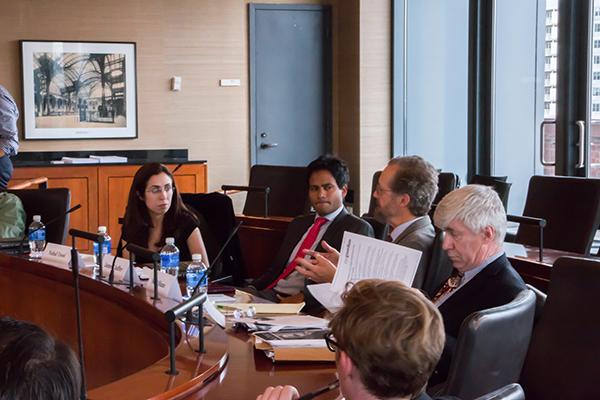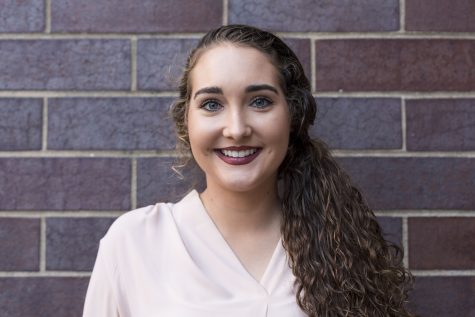Panel stirs public debate about drone program

Nahal Toosi moderates a discussion about America’s use of drone strikes with panelists Jameel Jafer, Scott Shane, and Jeremy Waldren.
October 28, 2015
Experts labeled the United States’ drone agenda one of the most secretive programs the government has ever had at a discussion held by the NYU School of Law on Tuesday.
Panelist Scott Shane discussed the drone program’s ability to target U.S. citizens in his book “Objective Troy.” The text focuses on the story of Anwar al-Awlaki, a U.S. citizen living in Yemen who was intentionally targeted by the Obama administration for allegedly planning terrorist attacks directed at his fellow citizens.
Shane said the biggest unintended consequence of al-Awlaki’s death was his lasting social media presence, which called for U.S. Muslims to attack the United States.
“This has had a huge impact, not just while he was alive, but now he is widely seen by his admirers as a religious martyr who speaks with greater authority from beyond the grave,” Shane said. “So even his innocuous videos on Islamic history take place in this framework of ‘this is the guy who America killed.’”
The panelists also discussed Obama’s 2013 reformation of the drone policy, which placed limits on the drone program to decrease the amount of unintended targets. However, panelist and ACLU Deputy Legal Director Jameel Jaffer said despite the new program’s standards, there has been ineffective implementation on the ground level.
“If you look at the program, there were exceptions made in regards to the standards,” Jaffer said. “There were large holes in the implementation of these new policies. In addition, the standards also use relatively vague words, like continuing imminent threat, whose exact meaning is withheld from the public.”
Panelist and NYU Law professor Jeremy Waldron said congressional leadership needs to be established to facilitate the lack of public debate on the drone program. Waldron said there should be a public consensus on what is being done in the name of the citizens.
“Public consideration needs to be taken into account,” Waldron said. “The opinion leaders of the community need to be able to come together. Congressional leaders need to lead, sponsor and facilitate a relatively formal public debate to provide further focus on the program.”
The panelists all agreed the selective disclosure the government has provided thus far has distorted the drone debate and restricted knowledge within the public forum.
Even with the reservations about the program after its widely publicized collateral damage upon civilians, the panelists also agreed that focusing on the individual accountability of rogue actors at the top of the government detracts from the larger problem.
Despite the panel’s collective agreement that the U.S. drone program needs reform, Shane said the drone program makes a valuable difference by protecting the lives of military personnel during extremely dangerous missions.
“Imagine a congressional hearing in which the president says despite knowing there is a proven technology for killing a [target] with absolutely no risk to personnel, and ignoring that, and continuing to send boots on the ground,” Shane said. “It is very difficult to make that choice. Much more difficult than it was prior to the technology of the drone.”
Email Lexi Faunce at [email protected].












































































































































